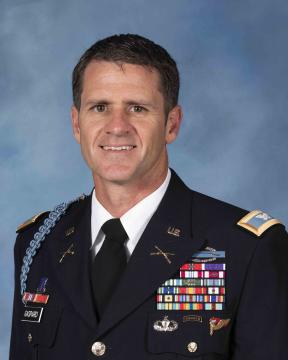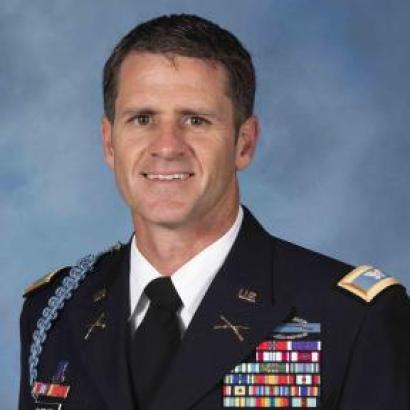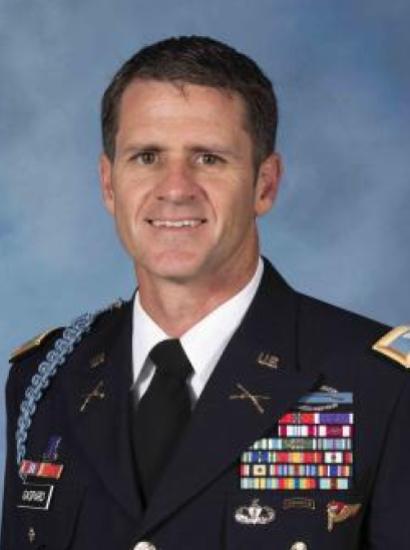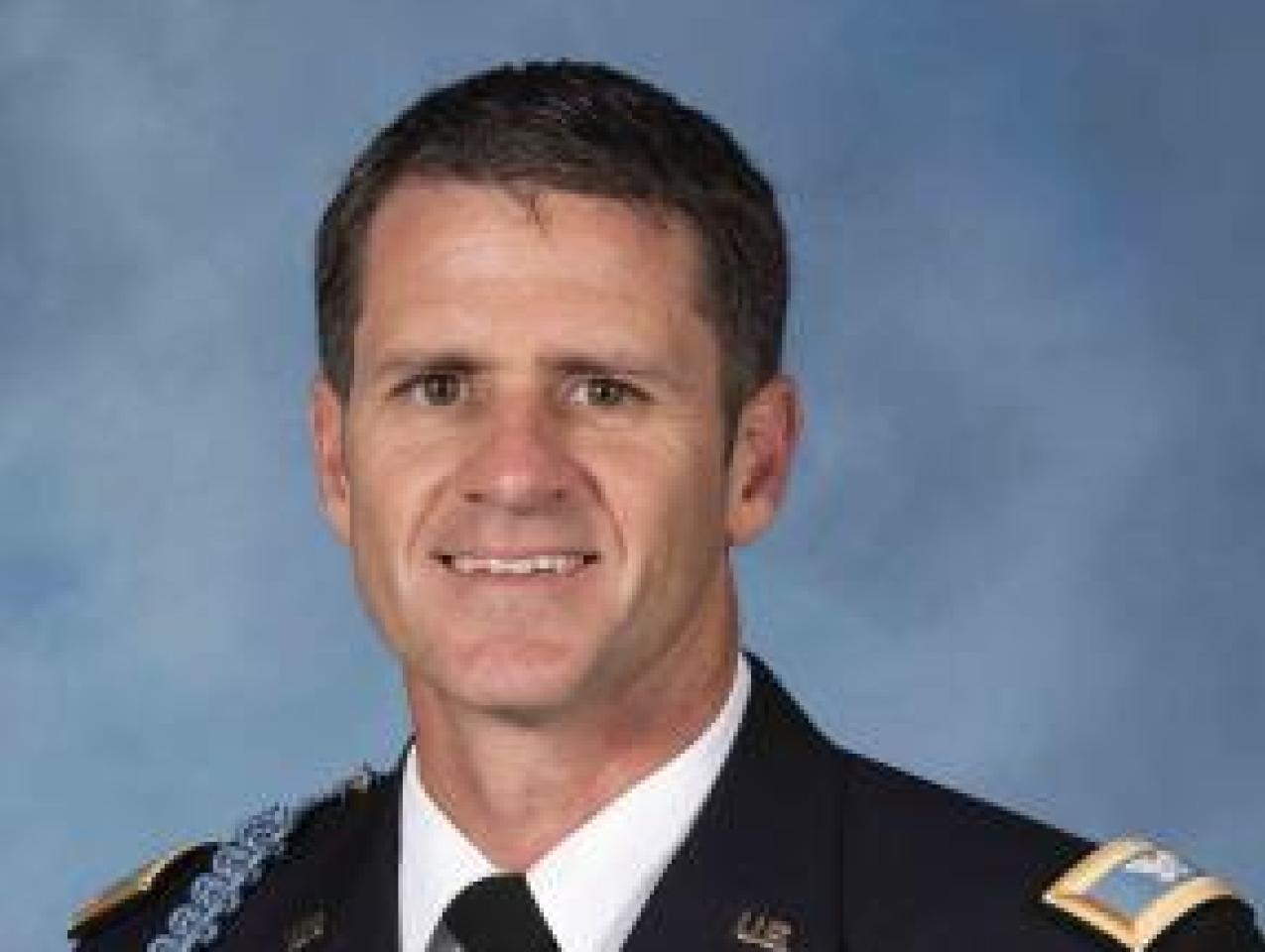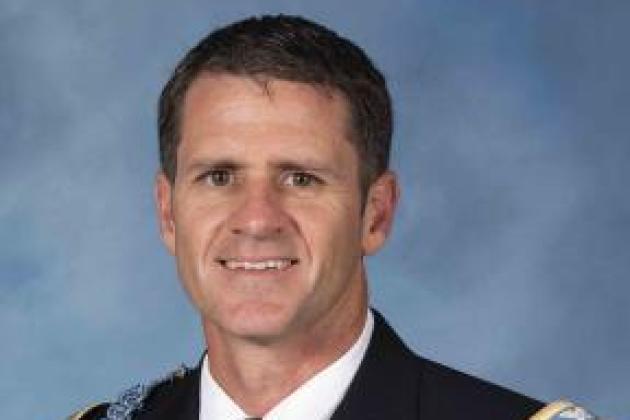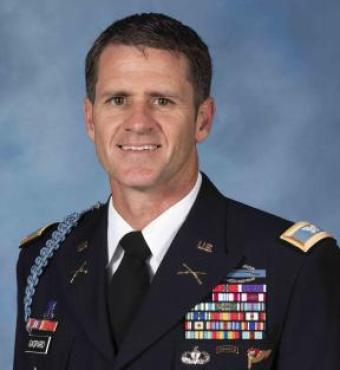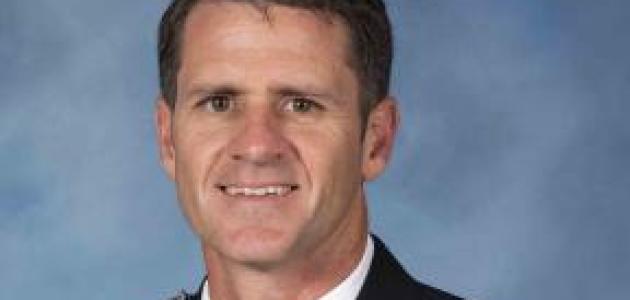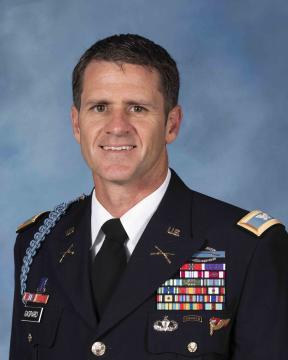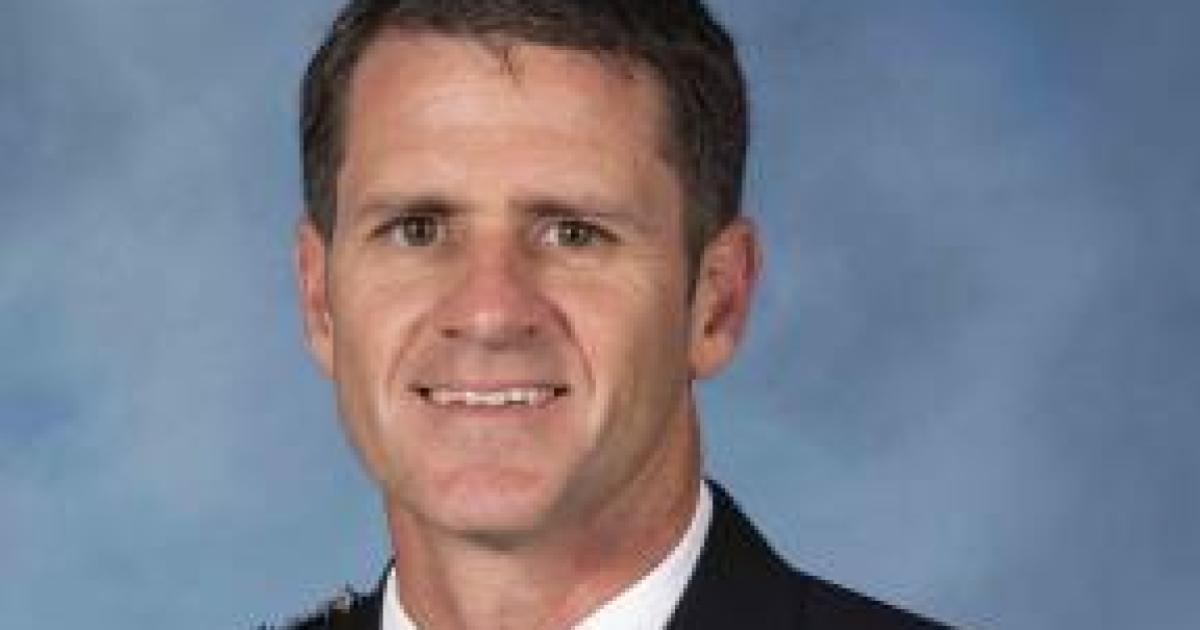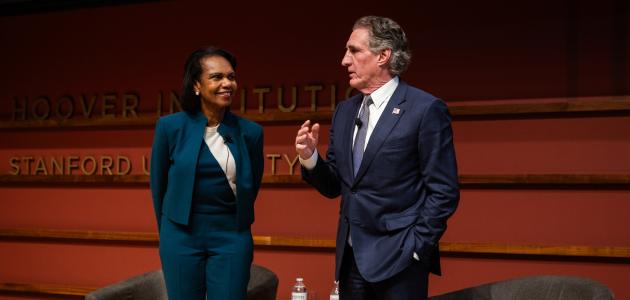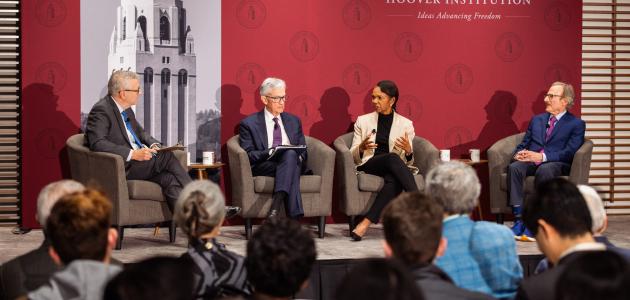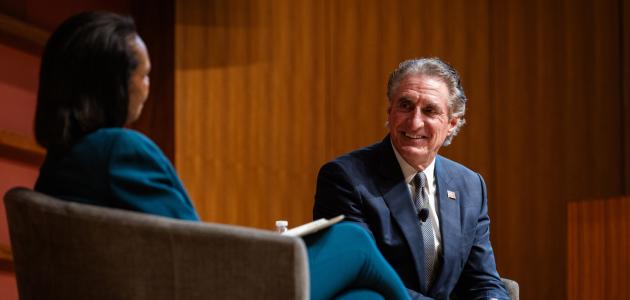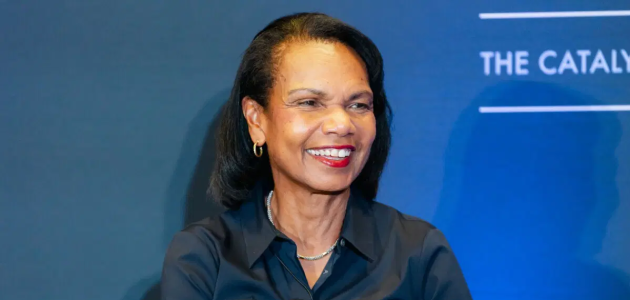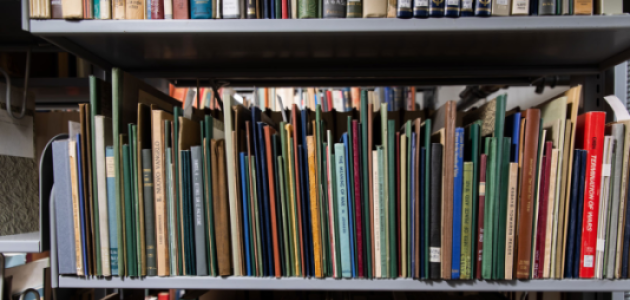Col. Joshua Gaspard, representing the US Army, is a National Security Affairs Fellow (NSAF) for the academic year 2022‒23 at the Hoover Institution.
In this interview, Colonel Gaspard discusses his two-decade-plus career as an Army infantry officer, including deployments to Afghanistan and Iraq, as well as Anchorage, Alaska, where he was a battalion commander charged with leading a reconnaissance unit stationed in the US Northern Command area of operations but assigned to the US Indo-Pacific Command.
Gaspard also describes his tenure as an academic instructor at West Point’s Systems Engineering Department, where he taught cadets supply chain management and operations management. During his fellowship year at the Hoover Institution, he is building on his expertise and experience in education to help soldiers and units better evaluate their operational performance as well as to teach senior military leaders how to best utilize artificial intelligence (AI) to enhance their decision-making processes.
Why did you decide to join the US Army?
Joshua Gaspard: No one in my immediate family was in the service. As I went through the college application process, many years ago, my mom and stepdad had come back from a recent visit to the US Air Force Academy in Colorado Springs, Colorado. They told me that the campus was beautiful. I did some subsequent research on the Air Force Academy and found that not only was the campus beautiful, but it also offered some phenomenal educational opportunities. I ended up applying there and a bunch of other schools in my home state of Texas. I recall one evening sitting at the kitchen table with my mom as we reviewed acceptance letters from the various schools I applied to. One of them was from the US Military Academy at West Point.
She said, “What are you thinking?" In my mind, I was thinking that the army certainly was attractive because I have always been a team sport person. I played a lot of sports growing up and loved to compete. On top of that, West Point, just like the Air Force Academy, had great educational opportunities and exceptional mentors from whose instruction I could benefit. At that moment in time, I decided to pursue West Point because I thought the army would be a great adventure. I can say that for over two decades of service, it has been the adventure of a lifetime.
Did your service begin around the period of the 9/11 attacks?
Joshua Gaspard: I was a senior cadet at West Point during the 9/11 attacks. At that time, I vividly remember being at a leadership conference on the academy proper. That morning, someone ran in the room and said, "A plane just ran into one of the Twin Towers," and we were like, holy cow. We lowered this huge projection screen and turned on the local news station. West Point is just fifty miles north of New York City. So, as we were standing there watching this tragedy unfold and getting our bearings straight, the second plane hit the south tower right in front of our eyes. The terror attacks occurred just nine months before graduation, so it really changed the trajectory of my career in the army, which was about to get started.
Where were you first deployed?
Joshua Gaspard: My first wartime deployment was to Iraq in March 2003. After I graduated from West Point in 2002, I trained at infantry school in Fort Benning, Georgia. I was then sent to the 173rd Airborne Brigade in Vicenza, Italy, and three weeks later I found myself on an Air Force C-17 airplane headed to Iraq, where I was a platoon leader during an airborne assault in that country’s north in early 2003.
Tell us about your career arc in the army.
Joshua Gaspard: I served on that deployment to northern Iraq for twelve months. I was then deployed to Afghanistan, again with the 173rd Airborne Brigade, for another year tour.
My wife, Andrea, was also in the army. From Germany, she embarked on her first deployment to Iraq. For her second deployment, the Army colocated us at the 173rd Airborne Brigade in Vicenza. So, we went to Afghanistan together for twelve months.
When we returned stateside, she went to Fort Campbell, Kentucky, and I went down again to Fort Benning for additional training. We then linked back up at Fort Campbell in the 101st Airborne (Air Assault) Division.
In the 101st, I first served as a battalion logistics officer and then as a company commander during a fourteen-month deployment to Iraq. Following my tour there, I went to the graduate school of engineering and applied sciences at Columbia University in New York. I earned two masters of science degrees in industrial engineering and engineering management systems. This education prepared me to teach at the Systems Engineering Department of West Point, a post where I spent two years.
After that, I went to Fort Bragg, North Carolina, with the 82nd Airborne Division. I did my major’s years down there, as we call it—the rank. I served as a battalion operations officer, battalion executive officer, and then ultimately what we call a brigade executive officer. A battalion consists of about 700 people, and a brigade has about 4,500 personnel. I also did another quick tour to Afghanistan during that assignment.
After Fort Bragg, my family and I moved from North Carolina to Alaska, where I would work in the exercises directorate for a subordinate command of US Northern Command in Anchorage, Alaska. While there, I found out that I was selected to be a battalion commander. I ended up commanding the Anchorage-based 1st Squadron, 40th Cavalry Regiment (Airborne), a battalion-size force responsible for reconnaissance missions. Two years later, I was selected to be the division operations officer in Hawaii with the 25th Infantry Division and US Army-Hawaii. That was my latest assignment in the army and now here I am at Hoover.
Will you tell us more about your educational background?
Joshua Gaspard: Coming from a three-stoplight town in Texas, I have been very fortunate that the army supported my educational development. At the Columbia University engineering school, I was surrounded by very smart folks: math-track stars. In my studies, I focused on statistics, optimization, and a bunch of different types of modeling, which we call deterministic and stochastic modeling. This means we observe various distributions and try to determine the probability that an event will occur, based on a specific set of parameters. As I mentioned earlier, this education prepared me to teach at West Point. I taught two business-centric courses. One was supply chain management and the other was operations management.
The supply chain management course covered the processes that need to be put in place for sourcing raw materials, manufacturing them into products, the transportation required after manufacturing, and in turn delivering those products to consumers. The operations management course demonstrates the internal processes of how a business develops, markets, and sells a product, as well as manage inventory.
During my lectures, I would often give real-world examples that the cadets regularly visited or used—say a coffee shop or online retailer. We would work through a seemingly simple problem: for instance, how many coffee cups should a store have on its shelves? The light bulbs would go off with the cadets when you would begin to layer seasonality variations and times of the day or week, cost of shelf space (rent), cost of delivery for those cups, and other variables. I would then ask them to create a model that predicts the quantity and types of cups that the shop should place on its shelves, based on a pattern analysis of sales. They quickly realized that it was way more complex than just ordering cups and having them on the shelves. This lesson was then expanded across many aspects of their future profession.
I thought this was a helpful critical thinking process for our young cadets. My hope is that they would always have a mental framework they could go back and reference because it was a tangible application to the real-world problems they would face in the army. The army captures various amounts of data on consumption rates. Similar models are used to determine the amount of water, MREs, ammunitions, and other sorts of supplies that our soldiers need for a specific mission set. I hope a few of those cadets were better prepared for those challenges.
What is your research focus at the Hoover Institution?
Joshua Gaspard: I am afforded an amazing opportunity here at Hoover for a variety of reasons. One, on a daily basis I get to engage with an amazing group of scholars. Two, there's a lot of wonderful resources to tap, including the world-renowned Library & Archives. And three, I've been in the army for a few years, and I've made some mistakes. This is a phenomenal opportunity to take the time and reflect on aspects of my career. What were the wins? When were the times that I hit it out of the park? And when were the times that I might have struck out? When did I not learn the lessons that I should have? Hoover has afforded me the opportunity to dig into those mistakes and truly think about those hard lessons learned. I will leave here a better officer because of it.
I have also been thinking about how the army at large can build in processes that allow soldiers at all grades to reflect on their performance. I want to look at methods that we can possibly bring out into the operational force, so that a unit can pause, reflect on their collective performance, and apply the lessons that they learned to their next immediate task and into the future.
If a soldier thought about his or her performance a week or a month after a mission, he or she may process events differently than in their immediate aftermath. That soldier may have taken more time to recollect and achieve a deeper understanding of the challenges the unit was confronting, or he or she may have talked with a colleague and received additional insights on how the unit’s performance can be improved. That’s when deeper learning and, really, true growth will occur.
The second issue I would like to explore is developing an education program in artificial intelligence for army leaders.
Artificial intelligence is everywhere and is layered in so many tasks and activities people do each day. It is even there as I compose an email and it finishes my sentences for me. Technology industry professionals in Silicon Valley and elsewhere in the country are an enormous asset in helping our senior military leaders identify the opportunities and challenges presented by AI. They can also help us offer solutions. Ultimately, those solutions, to me, are using AI as a tool to help us make better-informed and quicker decisions.
Such a program should be targeted to soldiers at the colonel level because that group has influence and engagement to strategic leaders. But colonels are also very close to the tactical level, so they are in a position to provide a hands-on approach in leading and guiding the implementation of artificial intelligence methods.
Are there any fellows who helped you increase your knowledge on this topic?
Joshua Gaspard: I would say Dr. Amy Zegart. She is amazing, in terms of having a full grasp of national security policy and intelligence. In the fall, she invited me and the other NSAFs to attend Tech Track 2 and listen to experts at Hoover, as well as leaders in the tech industry and government, talk about how to best anticipate challenges and opportunities that emerging technologies pose to the nation. This conference was particularly helpful in my own research on developing a program for senior military leaders to learn best practices in the application of AI.
Can you tell us about your experience mentoring Stanford undergraduates?
Joshua Gaspard: It has been great. Through Hoover’s National Security Affairs Fellowship, I am connected with three Stanford undergraduates: one senior and two juniors. These students are very intelligent and eager to learn.
The mentor-mentee component of the NSAF program has enabled me to see the world through these young people’s eyes, not just in terms of national security, but in all walks of life.
During my time with them, we often discuss trending current events. In many instances, their takes on issues are totally different than mine. I find that refreshing. Their insights have helped me broaden my understanding of the topics we discuss, as well as to think more deeply about the challenges confronting America and the world. In my next job, many of the folks that will be on my team will look just like the undergraduate students I am fortunate to interact with, so this is a great opportunity to learn from them.
What does leadership mean to you?
Joshua Gaspard: Over the years, I have read thousands of definitions of leadership. The older I get, the more I have become resolved in the idea that leadership means one thing: simply helping. If you are a leader, to me, you help. This could be as simple as making someone's job easier. It could be as simple as giving someone direction, ensuring they understand the objectives, or providing the necessary feedback along the way. It could also be as simple as helping someone from themselves. On the last point, for example, you could tell a team member, “You've been working extremely hard. I think this is the day that you need to go home and make sure that you spend time with your spouse and children.”
Leadership is selflessness to the T. As a leader, you should always be looking externally and creating a culture of helpers. When an archetypal leader walks into a room, it starts to buzz with energy. Team members are inspired to ask one another, “Hey, what are you working on and how can I help you with that?” That type of culture enables people to feel empowered, feel trusted, and feel they can accomplish great things together. Our job as leaders is to help people become the best version of themselves and to inspire a feeling they will always remember and want to carry into their future units.







